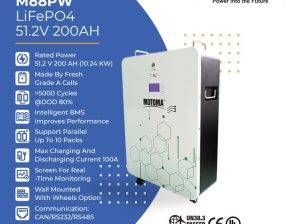The Importance of Lithium Battery Recycling for a Sustainable Future
Welcome to the era of technology, where gadgets and devices have become an essential aspect of our everyday existence. From smartphones to electric cars, most of these modern marvels rely on lithium-ion batteries for power. Unfortunately, as our dependence on electronic devices grows, the disposal of these batteries has become a growing concern for environmentalists worldwide. The solution? Lithium battery recycling! In this blog post, we will delve into the significance of lithium battery recycling and how it can help lead us towards a sustainable future. So, let’s dive in and explore this futuristic topic together!
Introduction to Lithium Battery Recycling
When it comes to recycling lithium batteries, there are a few things you need to know. For starters, what are they? Lithium batteries are found in many electronic devices such as laptops, cell phones, and electric cars. They’re also considered a “hazardous waste” by the EPA because of the chemicals they contain.
That might make them sound bad, but lithium batteries actually have a very high recycle rate – over 95%! The recycling process starts by removing the hazardous chemicals and then the metals are separated out for reuse. The recycling process not only saves these valuable resources from being lost forever, but it also conserves energy and reduces pollution.
Lithium battery recycling is an important part of creating a sustainable future for our planet. So next time you need to replace your laptop battery or phone battery, be sure to recycle the old one!
Rising Demand for Lithium Batteries and Potential Environmental Impact
With the increasing demand for lithium batteries, it is crucial to take into account the possible environmental consequences of their manufacturing and disposal.
Lithium batteries play a crucial role in numerous widely used consumer electronics like smartphones and laptops. They are also gaining popularity in electric vehicles. With the rising demand for such products, there is a corresponding increase in the demand for lithium batteries.
There is growing concern regarding the environmental impact of lithium battery production. The mining of lithium ore has been linked to significant land and water pollution. Furthermore, when batteries are discarded in landfills, they can release harmful chemicals into the environment.
Ensuring minimal environmental impact for lithium batteries is crucial and recycling plays a significant role in achieving this. By recycling, pollution from battery production and disposal can be reduced, while also conserving resources by extracting valuable materials from used batteries that can be used to create new ones.
Numerous companies have expertise in the recycling of lithium batteries. Moreover, various governments have implemented programs to promote the recycling of used batteries instead of disposing of them.
By recycling your used lithium batteries, you can help to make a difference in the environment.
Reasons for Lithium Battery Recycling and Benefits of Doing So
As the world increasingly moves to electric vehicles powered by lithium batteries, it’s critical that we have a sustainable plan for recycling these batteries. Here are some key reasons for recycling lithium batteries, and the benefits of doing so:
- Lithium batteries contain valuable materials that can be reused.
- Recycling lithium batteries helps reduce pollution and minimizes the impact on the environment.
- It conserves energy and natural resources by extracting metals from used battery cells instead of having to mine them from the ground.
- It creates jobs in the recycling industry and supports a circular economy.
- Lithium battery recycling helps ensure a secure supply of critical battery materials for the future.
By recycling lithium batteries, we can not only help protect our environment but also create jobs and support a sustainable future for electric vehicles powered by lithium batteries.
Lithium Battery Recycling How the Process Works
When it comes to recycling lithium batteries, the process is actually quite simple. First, the battery is dismantled and the cells are sorted by chemical makeup. Next, the cells are cleaned and any metal or other contaminants are removed. The cells are crushed and smelted down to create new battery cells.
The benefits of recycling lithium batteries are two-fold. Not only does it help reduce waste and pollution, but it also helps conserve valuable resources. Lithium is a finite resource, so by recycling old batteries we can help ensure that there will be enough lithium available for future generations.
Reuse Opportunities and Strategies
Lithium batteries are used in a variety of electronic devices, from cell phones to laptops. While the average person may not think twice about throwing out an old battery, the reality is that these batteries can have a major impact on the environment if they’re not properly recycled.
There are a number of ways to recycle lithium batteries, but one of the most effective is through battery-recycling programs. Many companies that use lithium batteries in their products offer recycling programs that allow customers to return used batteries for safe disposal.
In addition to recycle programs offered by companies, there are a number of independent recycling facilities that specialize in recycling lithium batteries. These facilities often have processes in place to extract valuable materials from the battery, such as cobalt and nickel, which can be reused in new batteries.
It’s important to note that simply discarding a lithium battery in the trash is actually illegal in many jurisdictions. This is because lithium batteries are classified as hazardous waste due to their chemical composition. If you’re unsure about how to properly dispose of a lithium battery, your best bet is to contact your local waste management authority for guidance.
The Future of Lithium Battery Recycling
Lithium batteries are one of the most popular types of battery on the market today, and their popularity is only increasing as more and more devices rely on them for power. As lithium batteries become more common, it’s important to think about how we’ll recycle them when they reach the end of their lifespan.
Currently, only about 5% of lithium batteries are recycled. This number needs to increase if we want to be able to sustainably manage the growing amount of lithium batteries in the world. Recycling lithium batteries is important because it allows us to recover the valuable materials they contain, like cobalt and lithium itself. These materials can then be used to create new batteries, reducing our need to mine for virgin materials.
There are a few different ways to recycle lithium batteries. One common method is thermal decomposition, which involves breaking down the battery into its component parts using heat. This method can be quite energy-intensive, however, so it’s not always the most sustainable option.
Another recycling method is called solvent extraction. This process uses chemicals to extract metals from battery cells, which can then be reused in new cells. Solvent extraction is less energy-intensive than thermal decomposition, but it still has some environmental impacts that need to be considered.
The third main recycling method for lithium batteries is pyrometallurgical processing. In this process, the battery cells are heated until the metal liquefies, at which point it can be poured
Conclusion
We hope this article has illuminated the importance of lithium battery recycling and how it applies to creating a more sustainable future. The fact that lithium batteries can be recycled is great news for those looking to limit their environmental impact, and there are numerous services available that make recycling your used lithium batteries easy. By partaking in responsible disposal habits, not only will you be helping preserve our planet, but also reaping personal rewards through cost savings or even the chance of earning profits.
Comments (8)
You must be logged in to post a comment.



[…] the demand for lithium battery recycling grows, innovative technologies are emerging to enhance the efficiency and effectiveness of the […]
[…] As battery usage becomes more widespread, it is essential to address environmental concerns associated with their production, use, and disposal. Many batteries contain hazardous materials, such as lead, cadmium, and mercury, which can pose risks if not properly managed. Recycling initiatives are being implemented to recover valuable materials and reduce environmental i… […]
[…] the most important benefit of renewable energy is its sustainability. By using renewable energy sources, we can reduce our dependence on fossil fuels and lower our […]
[…] concern is the disposal of LiPo batteries. Due to their hazardous chemical composition, LiPo batteries must be recycled or disposed of in a manner that prevents them from entering the environment. In many countries, […]
[…] culture promotes collaboration, innovation, and a sense of unity and purpose. Diversity is an important component of creating and sustaining a healthy corporate […]
[…] renewable energy sources, such as solar and wind, to power the batteries. In addition, the use of recycled materials in the manufacture of batteries can help to reduce the amount of energy and resources used. The proper disposal of used batteries […]
[…] lifespanImproved performanceCost SavingEnvironmentally friendly – LiFePO4 batteries are not only recyclable but also don’t contain the harmful chemicals that lead-acid batteries do. This makes them safer […]
[…] As batteries reach the end of their life cycles, it is crucial to dispose of them properly. Battery recycling programs help recover valuable materials and prevent hazardous substances from polluting the environment. Recycling also reduces the demand for new raw materials and promotes sustainability. […]